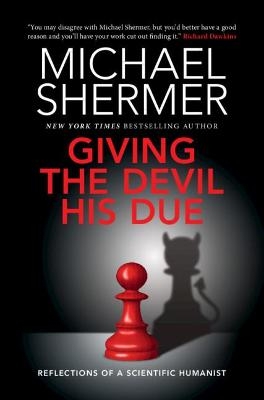
Giving the Devil his Due
Cambridge University Press (Verlag)
978-1-108-74758-5 (ISBN)
Who is the 'Devil'? And what is he due? The Devil is anyone who disagrees with you. And what he is due is the right to speak his mind. He must have this for your own safety's sake because his freedom is inextricably tied to your own. If he can be censored, why shouldn't you be censored? If we put barriers up to silence 'unpleasant' ideas, what's to stop the silencing of any discussion? This book is a full-throated defense of free speech and open inquiry in politics, science, and culture by the New York Times bestselling author and skeptic Michael Shermer. The new collection of essays and articles takes the Devil by the horns by tackling five key themes: free thought and free speech, politics and society, scientific humanism, religion, and the ideas of controversial intellectuals. For our own sake, we must give the Devil his due.
Michael Shermer is Presidential Fellow at Chapman University, California, the Publisher of Skeptic magazine, and the host of the Science Salon podcast, and for eighteen years he was a monthly columnist for Scientific American. He is the author of a number of New York Times bestselling books including Heavens on Earth (2018), The Moral Arc (2015), The Believing Brain (2011), and Why People Believe Weird Things (2000). His two TED talks, viewed over nine million times, were voted into the top 100 out of more than 2,000 TED talks.
Introduction. Who is the Devil and what is he due?; Part I. The Advocatus Diaboli: Reflections on Free Thought and Free Speech: 1. Giving the Devil his due: why freedom of inquiry and speech in science and politics is inviolable; 2. Banning evil: in the shadow of the Christchurch massacre, myths about evil and hate speech are misleading; 3. Free speech even if it hurts: defending Holocaust denier David Irving; 4. Free to inquire: the evolution-creationism controversy as a test case in equal time and free speech; 5. Ben Stein's blunder: why intelligent design advocates are not free speech martyrs; 6. What went wrong? Campus unrest, viewpoint diversity, and freedom of speech; Part II. Homo Religiosus: Reflections on God and Religion: 7. E pluribus unum for all faiths and for none; 8. Atheism and liberty: raising consciousness for religious skepticism through political freedom; 9. The curious case of Scientology: is it a religion or a cult?; 10. Does the Universe have a purpose?; 11. Why is there something rather than nothing?; Part III. Deferred Dreams: Reflections on Politics and Society: 12. Another dream deferred: how identity politics, intersectionality theory, and tribal divisiveness are inverting Martin Luther King, Jr's dream; 13. Healing the bonds of affection: the case for classical liberalism; 14. Governing mars: lessons for the red planet from experiments in governing the blue planet; 15. The Sandy Hook effect: what we can and cannot do about gun violence; 16. On guns and tyranny; 17. Debating guns: what conservatives and liberals really differ on about guns (and everything else); 18. Another fatal conceit: the lesson from evolutionary economics is bottom-up self-organization, not top-down government design; Part IV. Scientia Humanitatis: Reflections on Scientific Humanism: 19. Scientific naturalism: a manifesto for Enlightenment humanism; 20. Mr Hume: tear. Down. This. Wall.; 21. Kardashev's types and Sparks' law: how to build civilization 1.0; 22. How lives turn out: genes, environment, and luck – what we can and cannot control; Part V. Transcendent Thinkers: Reflections on Controversial Intellectuals: 23. Transcendent man: an elegaic essay to Paul Kurtz – a skeptic's skeptic; 24. The real hitch: did Christopher Hitchens really keep two sets of books about his beliefs?; 25. The skeptic's chaplain: Richard Dawkins as a fountainhead of skepticism; 26. Have archetype – will travel: the Jordan Peterson phenomenon; 27. Romancing the past: Graham Hancock and the quest for a lost civilization.
| Erscheinungsdatum | 23.07.2021 |
|---|---|
| Zusatzinfo | Worked examples or Exercises; 10 Halftones, black and white; 12 Line drawings, black and white |
| Verlagsort | Cambridge |
| Sprache | englisch |
| Maße | 152 x 227 mm |
| Gewicht | 550 g |
| Themenwelt | Sachbuch/Ratgeber ► Natur / Technik |
| Geisteswissenschaften ► Psychologie ► Allgemeine Psychologie | |
| Sozialwissenschaften ► Politik / Verwaltung | |
| ISBN-10 | 1-108-74758-2 / 1108747582 |
| ISBN-13 | 978-1-108-74758-5 / 9781108747585 |
| Zustand | Neuware |
| Haben Sie eine Frage zum Produkt? |
aus dem Bereich


